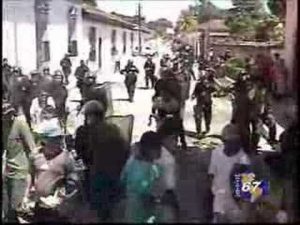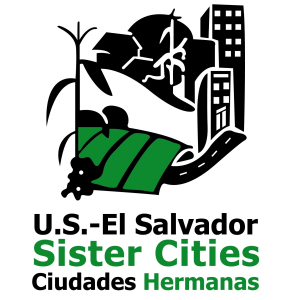Sister Cities
Report: Prison Conditions of the Political Prisoners – July 11, 2007
Report on the visit to the political detainees in the prisons
Women’s Prison:
Delegation of Deputies from the Legislative Assembly:
Nidia Díaz
Lorena Peña
Zoila Quijada
Mirtala López
Cristina Aviles.
Today, July 11, the group of Deputies from the FMLN visited the Women’s Prison in Ilopango and the Mariona Prison, where the 13 political prisoners captured July 2, 2007 are being held.
Summary of the visit:
Initially we met with the Technical Sub-Director of the prison and later the prison Director, Lic. Fany de Rodriquez joined the meeting. In response to our concerns they responded that our compañeras (comrades) were being accorded access to the same basic conditions that all the other detainees are provided: three meals a day, beds with mattresses to sleep on, access to purchasable items within the prison, visits with family members, access to personal items in accordance with a list of the personal needs of each (our compañeras had already presented these lists) and access to health care via a medical check-up that they underwent Monday, July 10th, by a pediatrician. We asked to be able to meet with the six compañeras to be able to talk with them and this was permitted and we were assigned a room in which to meet.
We then shifted to the meeting room where we awaited the compañeras. We met with all of them. We shared with them judicial-social information regarding the struggle and pressure being brought to bear for their release and we asked each of them to tell us about their situation, moment by moment, since they entered the prison.
The compañeras informed us that from the moment they entered the prison they were harassed by the guards who, for example, refused to remove their handcuffs so that they could eat lunch. They were submitted to psychological pressure due to their participation in Suchitoto and ties were drawn to the Belloso case. When they were being registered and having their personal data recorded, the guards did not want to register their correct educational levels, telling them instead that they were lying in an attempt to put them down. It was at this point that they threatened Lorena Araujo, telling her they would bring her to the isolation cell.
At the moment at which they were placed in their respective cells they were harassed further by the other inmates who accused them of being accomplices to Belloso the “informant” and threatened to lynch them.
Conditions in the cells where they are being housed:
The compañeras are divided up among 4 cells, each of which has an average of 80-90 inmates. The compañeras are in pairs. They do not have sheets, mattresses or beds upon which to sleep. In the case of Lorena, Rosa and Sandra, they are sleeping on the floor. In the case of the other three, other inmates are sharing their mattresses with them.
Hygienic supplies:
It is not permitted to bring toothpaste, toothbrush, soap, shampoo or other items into the prison; they are only permitted to purchase such items in the prison store which is property of the prison system. Water with which to bathe consists only of small pitchers which the inmates must purchase at a cost of $.10 – .20 cents per pitcher.
Health situation:
Monday, July 10th they were examined by a pediatrician, but only in a general manner without attending to the particular health concerns that each compañera expressed. Yanira suffers from constipation and is in treatment for displaxia and needs medication. Rosa Valle recently underwent a uterine operation, has chronic sinusitis as well as a urinary tract infection and had been taking medication. Beatriz suffers from allergic rhinitis.
Food:
They are given three meals a day and the menu is the same: sticky canned beans, yellow flower tortillas, miniature tamales, powered eggs and coffee. All the food is excessively iodized. They are not provided with drinking water or water with which to bathe, each of which they must purchase. The bathrooms do not work because there is no running water. The toilets are dirty.
The alimentary, hygienic and housing conditions are deplorable (to oblige the prisoners to purchase products from the prison store).
Schedule
The compañeras, as with all the other detainees leave their cells at 6:00 a.m. and return to their cells at 6:30 p.m. Lights out is at 9:00 p.m.
Visiting hours:
Visiting hours are once a week from 8:00 a.m. to 3:00 p.m. Each prisoner is allowed a vistor’s list of a maximum of 10 family members which may include husbands, children, mothers or fathers. No other friends or family members are allowed. In the case of domestic partners, a review process must be undertaken to prove such relationship and authorization must be granted by the PGR in order for partners to be able to enter the prison. Visitors are not allowed to bring any food items, nor black colored clothing, high heels or jewelry. Men must enter the prison in sandals and must be dully identified.
Security situation of the compañeras:
The compañeras are afraid for their security given the connection guards and inmates have made to the Belloso case. Initially they had space allotted to them in a patio area but that was not safe given that it was there that M. Grimaldi was murdered. They are spending their days in the grandmother’s area, an area designated for 60 women. They have provided them space (that they must pay for) to receive their visitors. It is not possible for the compañeras to have access to an area just for them; the director of the prison says that it is a policy of the prison system to accord them the same treatment as that to all common prisoners.
Commitments made during the visit with the compañeras:
- We asked the compañeras to write up their individual testimonies.
- We spoke with the director after our visit and asked her to reassign the 6 compañeras to the elderly unit. The director agreed to heed our request and to respond by Thursday at the latest.
- We asked that Rosa Valle and Haydee Chicas be allowed to work on their theses given that both are at thesis stage in their university studies. The director agreed.
- A public denouncement will be made based upon the personal testimonies of each of the compañeras. This will be written by Lorena and Mirtala, signed by all of them and circulated nationally and internationally to denounce the inhuman treatment that they have been submitted to within the prison.
- Delegations of Party functionaries will be organized to ensure that they receive continual visits within the prison.
- By means of the PDDHH (Human Rights Omsbudesman´s Office) two doctors will be provided access to the compañeras to carry out complete medical check-ups.
- The compañeras expressed their strength and conviction from within the prison and asked us to ensure the unity of efforts between the party and social movement organizations in order to achieve their freedom and to repeal the Anti-terrorist Law. They are secure in the knowledge that we will support their family members.
- They submitted a list of things they need that we will bring to them on Wednesday.
Parlamentary Delegation:
Darío Chicas
Hebert Amaya
Cristóbal Hernández
Nidia Díaz
Mirtala López
Rubia Cortéz
At 11:45 a.m. the delegation left for Mariona prison. We were met by the Director of the prison. We spoke with him about the situation of our compañeros and about conditions of over crowding within the prison (the prison’s capacity is for 850 prisoners but there are currently 3,372 inmates). We were taken by the Director to a meeting room, at this point we were accompanied by members of the press: Channel 2, TCS, El Noticiero, EDH, LG and El Mundo. Our compañeros were awaiting us there. It was hard to have a private conversation with them as we were under permanent harassment by the media and the guards who did not leave the sides of the compañero inmates for a moment. We were with them for approximately an hour during which they informed us as to their situation within the prison.
The 7 compañeros are in the Sector No. 1: (HIV, mental patients and new inmates). There are approximately 1,297 inmates in this sector).
Vicente and Clemente are in cell A-2
Facundo is in cell A-4
Manuel and Santos are in cell A-3
Hector and Ebert are in cell A-1
Conditions in the cells:
They are sleeping on the floor; they do not have beds, mattresses or sheets.
Hygiene:
There is running water in the prison, they don’t have to purchase water. They need articles of personal hygiene, toothbrushes, towels and combs.
Food:
They receive three meals a day but the menu is the same as in the women’s prison.
Health situation:
Ebert suffers from high blood pressure and had been under medical supervision.
Vicente also suffers from high blood pressure. All of them have colds, although this is the condition of all the prisoners.
Needs:
They ask for two changes of clothing, which is what is permitted to them, sandals, shoes and towels (to see family members).
They need money given that there is a group of prisoners who charge inmates a cell entrance fee of $2.10 per week.
They are also charged $0.25 for information as to when they have visitors.
Commitments:
- Mattresses will be purchased for each of them.
- Sheets will be obtained for each of them.
- Clothing will be brought for them.
- Money will be brought to them.
- Delegations of functionaries will be organized to visit them.
- Their families will be taken care of and we will look out for them.
- Their needs will be taken care of as they arise.


